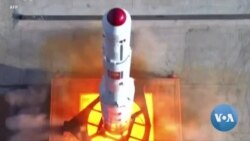Why most analysts believe North Korea will continue testing bigger and more powerful weapons in 2023.
Welcome to VOA Asia Weekly. I'm Chris Casquejo in Washington. That story is coming up, but first, making headlines.
Afghanistan’s Taliban rulers announced late on Tuesday that public and private universities across the country were being closed to female students until further notice, in the latest assault on Afghan women’s access to education and public life. The U.S. swiftly condemned what it called an “indefensible decision” and warned of consequences for the Taliban.
Medicine companies in China are giving priority to the supply of anti-fever drugs since the relaxation of COVID-19 restrictions earlier this month, state media reported. Extreme shortages of fever medicine are reported in major cities. In Beijing, social media accounts abound of overwhelmed morgues and crematoria, although the official count of COVID deaths remains in single digits.
China and Russia are holding joint naval exercises over the next several days. Russia’s defence ministry says the drills, which have taken place annually since 2012, will involve missile and artillery firing in the East China Sea.
The Bank of Japan raised the cap for its benchmark 10-year government bond yield Tuesday in a surprise move. Japan had been a holdout among major industrialized nations in allowing yields to rise. European nations and the U.S. have been hiking rates aggressively to battle inflation.
Sitiveni Rabuka won a close election in Fiji to be the South Pacific nation's first new prime minister in 16 years. Three political parties announced late Tuesday they would form a coalition, ending the long tenure of outgoing PM Frank Bainimarama.
North Korea launched a pair of medium-range ballistic missiles Sunday, which it said were part of an “important final-stage test” that will soon result in the country’s first spy satellite.
On Tuesday, the U.S. flew nuclear-capable bombers and advanced stealth jets near the Korean Peninsula for joint drills with South Korean warplanes.
The U.S. and its allies have warned for months that North Korea is in the final stages of preparing for what would be its seventh nuclear test since 2006.
This year, North Korea launched more than sixty missiles, more than it did in the previous six decades. But with world attention focused elsewhere, North Korea wasn’t an urgent global priority. At least for now, Pyongyang may be happy with that dynamic, as VOA’s Bill Gallo reports from Seoul, South Korea.
At this ICBM launch in March, North Korean leader Kim Jong Un starred as an action hero in a propaganda film on state TV. It was one of the most memorable images in a year filled with North Korean launches.
North Korea fired so many missiles that state media didn’t even bother to mention most of the incidents. The missile barrage also went largely unnoticed globally.
Google data shows searches for North Korea remained flat in 2022.
That contrasts with years past. In 2013, a single North Korean launch generated nearly half a million clicks on NK News, a North Korea-focused website, says founder Chad O’Carroll.
“This year those days where we’ve had 23 missile tests, I would hazard a guess that we're looking at low thousands of hits.”
Diplomatic focus on North Korea has also lagged. While the United States and its allies condemn the launches, talks with North Korea appear to be a relatively low priority.
Meanwhile, China and Russia have ensured North Korea is not further punished at the United Nations.
The lack of attention not only gives Kim space to build better weapons. It also risks legitimizing his nuclear arsenal, says analyst Mason Richey.
“It thinks it can probably be treated something like Pakistan, or India, or Israel, essentially broadcasting itself as a responsible nuclear possessing state outside of the boundaries of the Nuclear Nonproliferation Treaty.”
In September, North Korea passed a new law declaring itself a nuclear weapons state, with Kim calling the move “irreversible.”
The United States and its allies instead say denuclearization must remain the goal of any diplomacy with North Korea which helps explain why most analysts think North Korea will continue testing bigger and better weapons in 2023.
Bill Gallo, VOA News, Seoul, South Korea.
Visit voanews.com for the most up-to-date stories.
Thanks for watching VOA Asia Weekly. I’m Chris Casquejo. Until next week. We leave you now with some of the holiday decorations at the White House.












